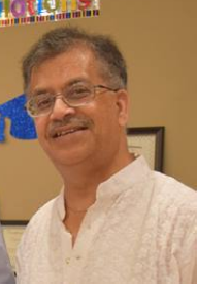At Bijaya, 2012
Given the long and varied history of
worship and devotion in India, we commonly hear the significance of the Bengali
religious festival, Durga Puja, in simple, perhaps layman's terms, as the "victory of good over evil". Somehow, throughout the world, this idea
finds great resonance, and in every culture we find this wish to be triumphant
over some imagined (or occasionally real) "evil" that is out there, waiting to disrupt or otherwise damage the presumed
"orderliness" of conscious life.
For the longest time, I have myself
accepted this notion of "good over evil" at face value, and have even spoken of
it in what now seems to me to be simplistic terms. In more recent times, however, upon
witnessing the state of events in the human world over several years, and
reflecting upon this good and evil paradigm, I have now come to the conclusion
that it is incumbent, in fact absolutely essential for all human beings
(not just Bengalis or Indians) to move away from this paradigm. In other words, I am asking for a fundamental
paradigm shift in this regard. Some might see this as rather radical, and
likely invoke ideas from established and venerable sources that clearly sustain
or reinforce the paradigm. Are the
established authorities, then, in error?
I shall come back to this issue a little later.
Let me discuss first why I believe
the good and evil paradigm has serious problems in its application or interpretation. To examine the paradigm, we must first
establish whether evil exists in this world, and if it does, how it affects
humans and other living beings. The
obvious straight answer to the question of evil is of course, yes, evil does
exist- it has existed from the very first time Being manifested itself. When that primal Sattva (the conscious Being)
first appeared, as Tagore tells us, it was full of questions, and had few
answers:
(MRC translation from
Rabindranath Tagore's Prashna)
The Sun of the first
Dawn
Witnessing
the fresh manifestation of Sattva
Queried, Who art Thou?
The
response was silence and enigma.
Eons
passed. Then, the last Sun of the very
last sunset,
Pronounced
its very last question
In
the stillness of dusk upon the western seashore,
Who art Thou? And there was no answer. (Trans. MRC 10 2012)
(Note: You can view every article as one long page if you sign up as an Advocate Member, or higher).





